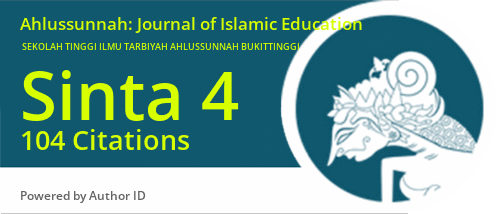Problem Based Learning Solutions to Improve Student Learning Outcomes
DOI:
https://doi.org/10.58485/jie.v3i3.290Keywords:
Problem-Based Learning, Learning Outcomes, Islamic Religious EducationAbstract
The implementation of Islamic Religious Education learning in the eleventh grade of State Senior High School One, Empat Koto District, Agam Regency, shows that teachers have not developed an appropriate learning model, and the teaching modules used are not yet appropriate to the learning process in the classroom, resulting in low student learning outcomes. This study aims to analyze the effectiveness of the application of problem-based learning models in improving student learning outcomes in Islamic Religious Education subjects. This study is a classroom action research that uses qualitative and quantitative approaches. Learning planning is carried out by reviewing learning outcomes, compiling learning objectives, preparing media and learning resources, and compiling student worksheets, evaluation questions, and observation sheets. The implementation of learning follows the stages of the problem-based learning model, namely problem recognition, organizing learning activities, guiding the investigation process, presenting results, and evaluating the problem-solving process. Learning evaluation is carried out in two cycles. In the first cycle, the first meeting, the results are in the sufficient category; the first cycle, the second meeting, increases to the good category; and in the second cycle, the first meeting, the learning outcomes are in the very good category. These results indicate that the application of the problem-based learning model is effective in improving student learning outcomes in Islamic Religious Education subjects.
Downloads
References
Adel, S., Athari, Z., Febriani, A., Oktavia, G. ., & Burhanudin, B. (2025). The Qur’an as a Source of Solutions for the Global Moral Crisis. Journal of Quranic Teaching and Learning, 1(2), 18-33. https://joqer.intischolar.id/index.php/joqer/article/view/10
Aryanti, Y., Mutathahirin, M., Rahman, I., & Mulyani, R. (2022). Teacher Analysis Study According to Imam Al Ghazali in the Book of Al Adab Fi Al-Din. Ahlussunnah: Journal of Islamic Education, 1(2), 46-58. https://doi.org/10.58485/jie.v1i2.177
Dasrizal, D., Rambe, K. F., Sihombing, C. D., Khalid, E., & Safitri, D. A. (2025). Distortion of Quranic Interpretation on Socialmedia: An Analysis of the Spread of Misleading Meanings. Journal of Quranic Teaching and Learning, 1(2), 65-82. https://joqer.intischolar.id/index.php/joqer/article/view/8
Efendi, E., Ramadhani, R., Kamil, R. A., & Rahman, I. (2022). The Effect Of Building The Islamic Character Of Students At Wisma Padang State University. Jurnal Kepemimpinan dan Pengurusan Sekolah, 7(3), 271-280. https://doi.org/10.34125/jkps.v7i3
Engkizar, E., Jaafar, A., Alias, M. F. B., Guspita, R., & Albizar, A. (2025). Utilisation of Artificial Intelligence in Quranic Learning: Innovation or Threat?. Journal of Quranic Teaching and Learning, 1(2), 1-17. https://joqer.intischolar.id/index.php/joqer/article/view/7
Engkizar, E., Jaafar, A., Masuwd, M. A., Rahman, I., Datres, D., Taufan, M., Akmal, F., Dasrizal, D., Oktavia, G., Yusrial, Y., & Febriani, A. (2025). Challenges and Steps in Living Quran and Hadith Research: An Introduction. International Journal of Multidisciplinary Research of Higher Education (IJMURHICA), 8(3), 426–435. https://doi.org/10.24036/ijmurhica.v8i3.396
Engkizar, E., Jaafar, A., Sarianto, D., Ayad, N., Rahman, A., Febriani, A., ... & Rahman, I. (2024). Analysis of Quran Education Problems in Majority Muslim Countries. International Journal of Islamic Studies Higher Education, 3(1), 65-80. https://doi.org/10.24036/insight.v3i1.209
Engkizar, E., Jaafar, A., Taufan, M., Rahman, I., Oktavia, G., & Guspita, R. (2023). Quran Teacher: Future Profession or Devotion to the Ummah?. International Journal of Multidisciplinary Research of Higher Education (IJMURHICA), 6(4), 196-210. https://doi.org/10.24036/ijmurhica.v6i4.321
Engkizar, E., Muslim, H., Mulyadi, I., & Putra, Y. A. (2025). Ten Criteria for an Ideal Teacher to Memorize the Quran. Journal of Theory and Research Memorization Quran, 1(1), 26-39. https://joesmiq.intischolar.id/index.php/joesmiq/article/view/54
Khoiri, Q., & Nopitasari, M. (2024). Pengelolaan interaksi belajar-mengajar. Jurnal Pendidikan Islam Al-Affan, 4(2), 199-205. https://doi.org/10.69775/jpia.v4i2.193
Putra, R. P. (2024). Objek Evaluasi Hasil Belajar Pendidikan Agama Islam Analisis Taksonomi Bloom (Kognitif, Afektif, Psikomotorik). Edu Global: Jurnal Pendidikan Islam, 5(1), 18-26. https://doi.org/10.56874/eduglobal.v5i1.1590
Putri, G. S. D. S., Rahmah, I. A., Janah, V. R., Suriansyah, A., & Cinantya, C. (2024). Penerapan Model Pembelajaran Problem Based Learning untuk Meningkatkan Motivasi dan Kemampuan Berpikir Kritis Siswa Sekolah Dasar. MARAS: Jurnal Penelitian Multidisiplin, 2(4), 1954-1963. https://doi.org/10.60126/maras.v2i4.544
Putri, N., Noprianti, A., & Oktavia, G. (2025). The Qur'an as a Source of Solutions for the Global Moral Crisis. Journal of Quranic Teaching and Learning, 1(2), 90-105. https://joqer.intischolar.id/index.php/joqer/article/view/10
Rahman, I., Iskandar, M. Y., Kustati, M., & Sepriyanti, N. (2024). Sustainable Development: Implementation of The Talqin Method In Memorizing The Quran. Jurnal Kepemimpinan dan Pengurusan Sekolah, 9(1), 99-108. https://doi.org/10.34125/jkps.v9i1.355
Rahman, I., Kaema, M. T., Nurhapipah, N., Nelwati, S., Sabri, A., & Rahmanda, R. (2024). Systematic Literature Review: Analysis of Project-based Learning Models from Elementary to High School. Al-Ashri: Ilmu-Ilmu Keislaman, 9(2), 53-66. https://ojs.stai-bls.ac.id/index.php/Al-Ashri/article/view/119
Rahman, I., Wati, W., Putri, N., Wulandari, R., & Habibi, U. A. (2025). Commercialization of Quranic Tahfidz Houses in Indonesia: Da’wah or Business?. Journal of Quranic Teaching and Learning, 1(2), 34-48. https://joqer.intischolar.id/index.php/joqer/article/view/6
Rasdiany, A. N., Akmal, F., Pasaleron, R., Dafrizal, D., Ningsih, R., & Rahman, I. (2024). Systematic Literature Review: The Impact of Social Competence on Teacher Communication Intelligence. Jurnal Kepemimpinan dan Pengurusan Sekolah, 9(2), 239-251. https://doi.org/10.34125/jkps.v9i2
Rasyad, I., & Wulandari, S. R. (2024). Strategi Guru Dalam Mengoptimalkan Interaksi Siswa Di Kelas. Jurnal Multidisiplin Ilmu Akademik, 1(4), 81-88. https://doi.org/10.61722/jmia.v1i4.1876
Riza, S., & Barrulwalidin, B. (2023). Ruang Lingkup Metode Pembelajaran. ISLAMIC PEDAGOGY: Journal of Islamic Education, 1(2), 120-131. https://doi.org/10.52029/ipjie.v1i2.157
Syamsudin, S. (2020). Problem based learning dalam mengembangkan kemampuan berpikir kritis dan keterampilan sosial. ELSE (Elementary School Education Journal): Jurnal Pendidikan Dan Pembelajaran Sekolah Dasar, 4(2), 81-99. https://doi.org/10.30651/else.v4i2.4610
Umar, J. (2020). Analisis Tingkat Pemahaman Terhadap Mata Pelajaran Agama Islam pada Siswa SMP Negeri 1 Delima Pidie. Jurnal Mudarrisuna: Media Kajian Pendidikan Agama Islam, 10(2), 180-191. https://doi.org/10.22373/jm.v10i2.7837
Downloads
Published
How to Cite
Issue
Section
License
Copyright (c) 2024 Arif Ridha, Rivaldo Rivaldo

This work is licensed under a Creative Commons Attribution-ShareAlike 4.0 International License.
Creative Commons Attribution 4.0 (CC BY)











